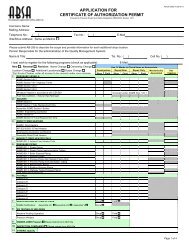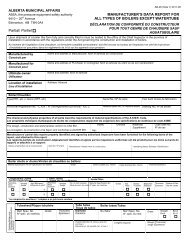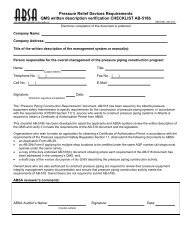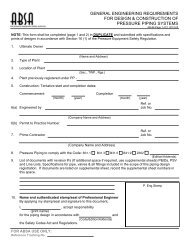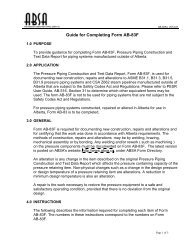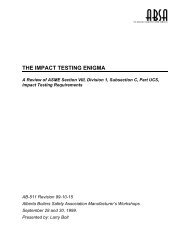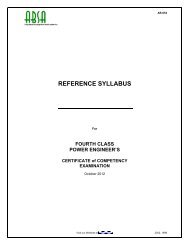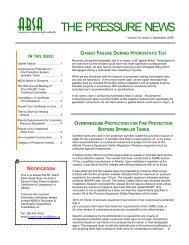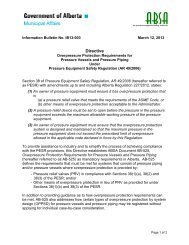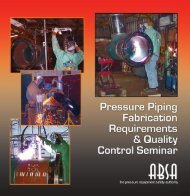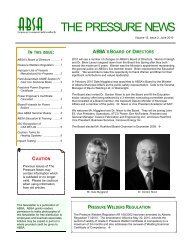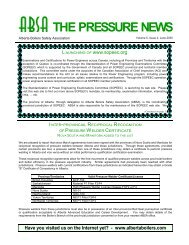The Baker Panel Report - ABSA
The Baker Panel Report - ABSA
The Baker Panel Report - ABSA
Create successful ePaper yourself
Turn your PDF publications into a flip-book with our unique Google optimized e-Paper software.
INCORPORATION OF PROCESS SAFETY INTO MANAGEMENT DECISION-MAKINGIn addition to a lack of a high-ranking process safety leader who can ensure that process safety is sufficiently considered in managementdecision-making, the <strong>Panel</strong> detected several issues with BP’s approach to incorporating process safety into management decision-making. Inthe implementation of its business plans, BP establishes various goals and metrics for performance, including financial performance,operating performance, environmental performance, and personal safety performance. In this process, as discussed in Section IV andelsewhere in this report, BP relies to a large degree on its performance contract system to drive conduct in a manner consistent with itscorporate goals. To a large degree, the BP system focuses on measurement and monitoring of performance results against these corporateobjectives, established at the corporate level and cascaded through the BP organization using performance contracts. <strong>The</strong>se performancecontracts establish goals and metrics, and management at different levels of the organization monitors performance against the metrics toprovide assurance that corporate objectives are being accomplished. <strong>The</strong> system also uses many goals and metrics, including financial resultsand production, that are capable of measurement and feedback in the short-term. For Refining, other metrics used include availability ofrefineries for operation and personal injury rates. <strong>The</strong> performance system has a decidedly short-term emphasis, with performance contractstypically focused on annual metrics and goals.Without commenting specifically on the use of performance contracts, the <strong>Panel</strong> believes that this general approach of establishingperformance metrics and targets to accomplish corporate objectives, including the use of annual metrics, is not unusual. <strong>The</strong> <strong>Panel</strong> believes,however, that process safety considerations, many of which have implications that extend well beyond one year, have not been consideredadequately in BP’s management decision-making process and the implementation system used to drive conduct, at least in the U.S. refiningoperations. Many decisions relating to process safety involve costs and benefits that are both long-term in nature and sometimes difficult tomeasure. In making these decisions, how should management measure the benefits of expenditures intended to improve process safetyperformance, such as expenditures for training or additional testing of equipment? <strong>The</strong> costs, in terms of present dollars to be spent, can bedetermined or estimated with relative certainty; the benefits, in terms of an incremental reduction of process risk (i.e., incremental reduction oflikelihood of occurrence of a process incident), perhaps occurring over an indeterminate period, can often be very difficult to estimate. <strong>The</strong>benefit of some of these types of expenditures may not be known or realized for many years.In addition, while BP promulgates broad, aspirational goals, it delegates substantial discretion to refinery plant managers without clearlydefining process safety expectations or responsibilities. BP’s framework lacks meaningful checks and balances, and while accountability is acore concept in BP’s Management Framework for driving desired behavior, BP has not demonstrated that it has effectively held those withrefinery line accountability responsible for process safety performance at its U.S. refineries.> Short-term focus<strong>The</strong> <strong>Panel</strong> observes that BP directs a great deal of attention to short-term performance that is capable of quick measurement, analysis, andfeedback (e.g., profitability, production, environmental performance, and injury rates). BP provides clear expectations for performance in theseareas, and can promptly ascertain how various decisions and events impact BP’s performance. This focus is reflected in BP’s reliance onperformance contracts, which are the primary consideration in determining annual bonuses. <strong>The</strong> metrics and milestones contained inperformance contracts have historically focused on short-term performance in areas such as profitability, production, environmental, andinjury rates, all of which are measured in a relatively short (one year) period.Assessments of process safety performance and capabilities, however, require metrics that differ from those used to assess performance inother areas and a management system that can measure performance against those metrics. <strong>The</strong> fact that a facility has not had a significantprocess safety incident for some time may say little about the true state of process safety at that site or the potential for a major processincident. Decisions and events impacting process safety or human capability may not have a discernible impact for many years. For example, aCorporate Safety Culture C 90



